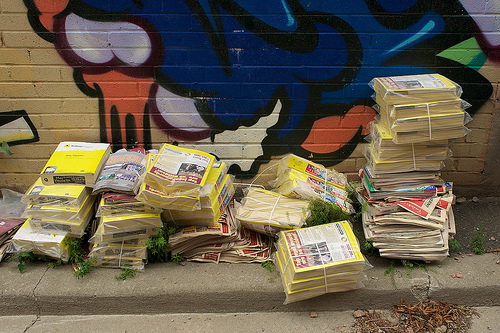It’s been almost two years since we first wrote about the minor plague of the white pages. Customers don’t use them and phone companies don’t want to distribute them. Although almost no one wanted more printed white pages, an outdated law in Washington required their delivery every fifteen months, like it or not.
It was a colossal waste, a perfect example of sustainability made illegal. It was absurd.
Last week, however, state regulators finally agreed to change the law.
No longer will state residents hear the annoying thud of unwanted white pages, and no longer will state law mandate pointless waste. Under the new regulations, phone companies are free to not deliver physical phone books. Since the telecoms already don’t want to print and deliver them in metropolitan areas, they won’t. In rural areas, where white and yellow page directories are typically co-bound and much slimmer, the phone companies will likely continue to deliver phone books, but they are now required to provide an “opt-out” mechanism for customers who want to avoid automatic delivery. Washington will now join at least 18 other states where white pages directories are not delivered by legal mandate.
It’s important to note that optional delivery will not be unfair to the poor or elderly. At Sightline’s urging, the state’s new regulations require phone companies to provide free printed directories to those who request them, and to make electronic directories available on the web. (And contrary to an oddball argument made by the state Attorney General’s office, optional white pages will not jeopardize public safety.)
Ending Washington’s regime of mandatory white pages may seem like a small thing, yet it is worth celebrating. It marks the end of a pointless waste of resources, a little less annoyance for state residents, and reduced public costs for waste management. It’s a great example of how we can make sustainability legal.
A few thanks are in order. Sightline’s Pam MacRae helped draft innumerable formal comments to state regulators, and Sightline’s board president Jeanette Henderson, a veteran of the yellow pages wars, slogged with us through a very long rule-making process. We were fortunate to be joined in our quest by the City of Seattle, particularly by Councilmember Mike O’Brien and his staff, and by Tim Croll, solid waste director at Seattle Public Utilities. Here is the City’s official statement on the new regulations.










Danny
Now if only Oregon would fall in line!
Callie Jordan
Wow, amazing. Last I’d heard it sounded like inertia would prevail.
But that’s without taking into account the hard behind-the-scenes work and coalition building around well-researched info that Sightline is so good at.
I’m impressed.
Was the public input you solicited enough to help make a difference?
PS Is there something trying to happen in Oregon??
Eric de Place
Callie,
I believe the public input did help. Very few members of the general public make themselves heard in regulatory proceedings like this, so I always think it’s helpful to have citizen comment.
There’s no parallel effort currently underway in Oregon. It’s my understanding that Oregon’s white pages law is less obnoxious than Washington’s was. If that’s not the case, I’d be delighted to hear from folks in Oregon who may know the details.
gb98501
What do you think about the UTC’s claimed effect:
The change is expected to remove more than 300 tons of unwanted paper directories from waste and recycling bins annually, reducing carbon dioxide emissions by 4,000 tons and saving local governments hundreds of thousands of dollars a year in waste-processing costs.
Does that seem accurate?
Eric de Place
Yes, definitely!
If anything the UTC’s claims are too modest. Early on, I did some back-of-the-envelope waste calculations using somewhat different assumptions about current deliveries and regulatory reform. But anyway, leaving aside the technical details, my estimates of waste reduction were much higher: http://www.sightline.org/2011/06/27/white-pages/.
Ray S
A phone book (only need 1) is useful to me. Will the phone company be asking?
Eric de Place
Ray,
Under the new regulation, telephone companies “must establish or arrange for reasonable means for its customers to… request to receive, or not to receive, a printed directory.” I wish the new law were a bit more specific, but it’s fair to say that, yes, they will be asking you whether you’d like a printed directory in addition to the electronic version(s) that will also be available.